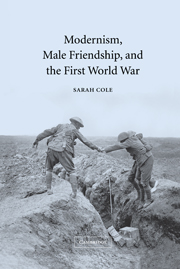Book contents
- Frontmatter
- Contents
- Acknowledgments
- Introduction
- 1 Victorian dreams, modern realities: Forster's classical imagination
- 2 Conradian alienation and imperial intimacy
- 3 “My killed friends are with me where I go”: friendship and comradeship at war
- 4 “The violence of the nightmare”: D. H. Lawrence and the aftermath of war
- Notes
- Index
4 - “The violence of the nightmare”: D. H. Lawrence and the aftermath of war
Published online by Cambridge University Press: 22 September 2009
- Frontmatter
- Contents
- Acknowledgments
- Introduction
- 1 Victorian dreams, modern realities: Forster's classical imagination
- 2 Conradian alienation and imperial intimacy
- 3 “My killed friends are with me where I go”: friendship and comradeship at war
- 4 “The violence of the nightmare”: D. H. Lawrence and the aftermath of war
- Notes
- Index
Summary
“Having you, I can live all my life without anybody else, any other sheer intimacy. But to make it complete, really happy, I wanted eternal union with a man too: another kind of love.”
D. H. Lawrence, Women in Love (Rupert Birkin)“that is the sum of my whole experience, the search for a friend.”
D. H. Lawrence, Aaron's Rod (James Argyle)“But my idea is … every man should have a mate – like most of us had in the war.”
D. H. Lawrence, Kangaroo (Jack Calcott)Comradeship did not disappear after the war. If the war-scarred friend now became a figure in the civilian landscape, the ideal of transcendent male bonds also found new life in the post-war setting. For many years after 1918, the essential problems of war – loss, injury, mourning, death – would occupy a critical place in British life, and the Victorian history of organizing intimacy, though tarnished, nevertheless retained a foothold as part of the culture's repertory for understanding and processing the trauma of war. No literary figure was more concerned with these shifts and movements than D. H. Lawrence. His is a voice of apotheosis for male intimacy, an unceasing and restless spirit demanding that the social order accommodate and embrace masculine bonds. In Lawrence's writing, the combined effects of the longing for male friendship and its devastating failure are conspicuously derived, and the connection between war and masculine intimacy haunts his work.
- Type
- Chapter
- Information
- Modernism, Male Friendship, and the First World War , pp. 185 - 251Publisher: Cambridge University PressPrint publication year: 2003



